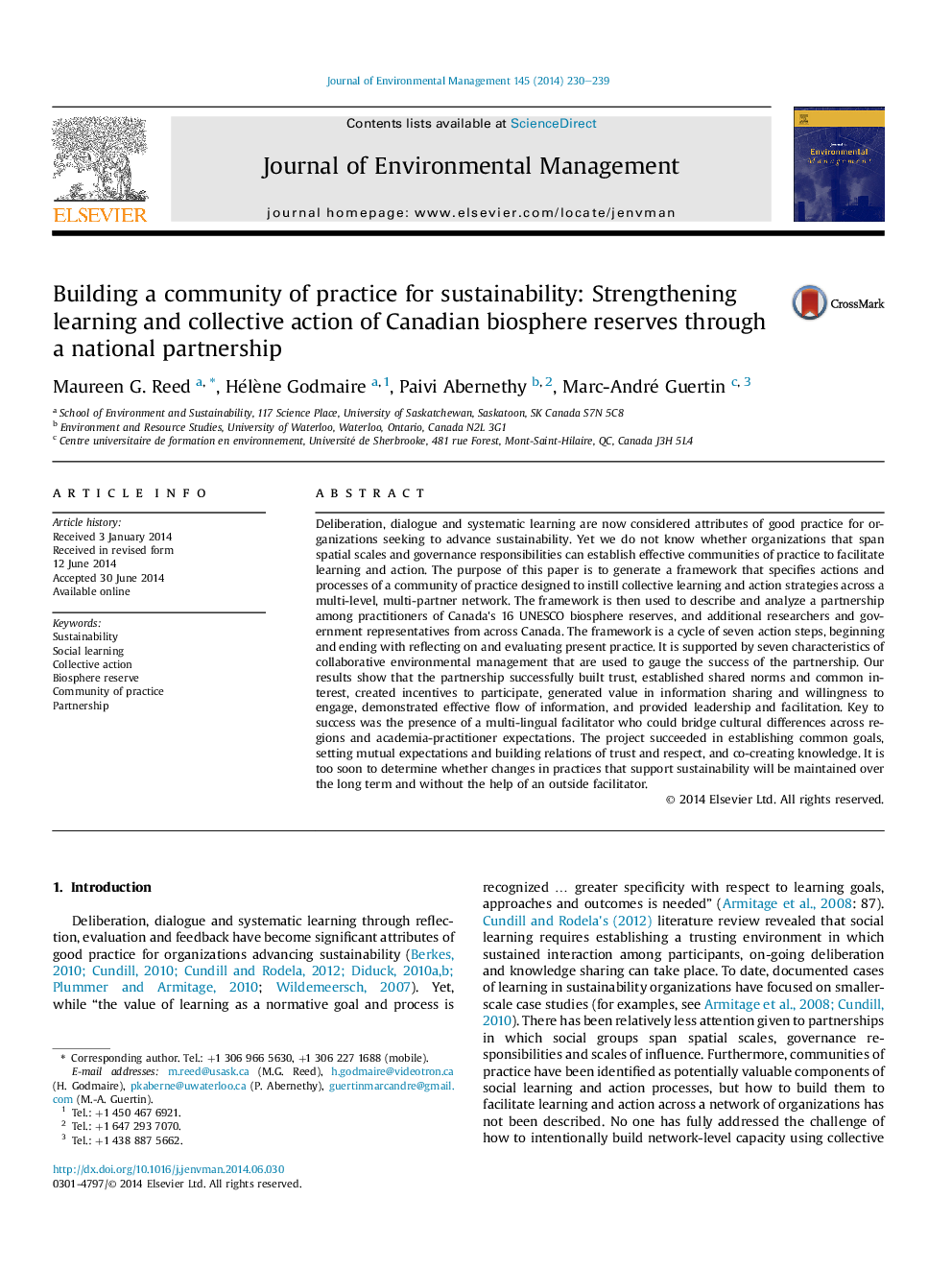| کد مقاله | کد نشریه | سال انتشار | مقاله انگلیسی | نسخه تمام متن |
|---|---|---|---|---|
| 7483502 | 1485267 | 2014 | 10 صفحه PDF | دانلود رایگان |
عنوان انگلیسی مقاله ISI
Building a community of practice for sustainability: Strengthening learning and collective action of Canadian biosphere reserves through a national partnership
ترجمه فارسی عنوان
ایجاد یک جامعه از تمرین برای پایداری: تقویت یادگیری و اقدام جمعی از ذخایر بیوسفران کانادا از طریق مشارکت ملی
دانلود مقاله + سفارش ترجمه
دانلود مقاله ISI انگلیسی
رایگان برای ایرانیان
کلمات کلیدی
پایداری، یادگیری اجتماعی، اقدام جمعی، ذخیره بیوسفر، انجمن تمرین شراکت،
ترجمه چکیده
در حال حاضر بحث، گفتگو و یادگیری منظم، ویژگی هایی از عملکرد خوب برای سازمان هایی است که به دنبال توسعه پایدار هستند. با این حال ما نمی دانیم که سازمان هایی که مقیاس های فضایی و مسئولیت های حاکمیت را پوشش می دهند، می توانند جوامع موثر را برای تسهیل یادگیری و عمل ایجاد کنند. هدف از این مقاله ایجاد یک چارچوب است که مشخصه اقدامات و فرایندهای یک جامعه از تمرین طراحی شده برای آموزش یادگیری جمعی و استراتژی های عمل در یک شبکه چند سطح، چند طرفه است. سپس این چارچوب برای توصیف و تجزیه و تحلیل مشارکت در میان کارفرمایان 16 ذخایر بوم شناختی یونسکو کانادا و محققان و نمایندگان دولتی سراسر کانادا مورد استفاده قرار می گیرد. چارچوب یک چرخه هفت گام عملی است، آغاز و پایان دادن به بازتاب و ارزیابی عمل کنونی است. این هفت ویژگی از مدیریت زیست محیطی مشترک است که برای سنجش موفقیت مشارکت استفاده می شود. نتایج ما نشان می دهد که مشارکت با موفقیت ایجاد اعتماد، ایجاد هنجارهای مشترک و منافع مشترک، ایجاد انگیزه برای مشارکت، ایجاد ارزش در به اشتراک گذاری اطلاعات و تمایل به مشارکت، ارائه جریان موثر اطلاعات، ارائه رهبری و تسهیل. کلید موفقیت، حضور یک تسهیلگر چند زبانه بود که می تواند اختلافات فرهنگی را در میان مناطق و انتظارات دانشگاهیان تمرین کند. این پروژه موفق به ایجاد اهداف مشترک، ایجاد انتظارات متقابل و ایجاد روابط اعتماد، احترام و ایجاد دانش گردید. خیلی زود تعیین می شود که آیا تغییرات در شیوه هایی که از پایداری پشتیبانی می کنند، در بلندمدت و بدون کمک یک تسهیل کننده خارج، حفظ خواهند شد.
موضوعات مرتبط
مهندسی و علوم پایه
مهندسی انرژی
انرژی های تجدید پذیر، توسعه پایدار و محیط زیست
چکیده انگلیسی
Deliberation, dialogue and systematic learning are now considered attributes of good practice for organizations seeking to advance sustainability. Yet we do not know whether organizations that span spatial scales and governance responsibilities can establish effective communities of practice to facilitate learning and action. The purpose of this paper is to generate a framework that specifies actions and processes of a community of practice designed to instill collective learning and action strategies across a multi-level, multi-partner network. The framework is then used to describe and analyze a partnership among practitioners of Canada's 16 UNESCO biosphere reserves, and additional researchers and government representatives from across Canada. The framework is a cycle of seven action steps, beginning and ending with reflecting on and evaluating present practice. It is supported by seven characteristics of collaborative environmental management that are used to gauge the success of the partnership. Our results show that the partnership successfully built trust, established shared norms and common interest, created incentives to participate, generated value in information sharing and willingness to engage, demonstrated effective flow of information, and provided leadership and facilitation. Key to success was the presence of a multi-lingual facilitator who could bridge cultural differences across regions and academia-practitioner expectations. The project succeeded in establishing common goals, setting mutual expectations and building relations of trust and respect, and co-creating knowledge. It is too soon to determine whether changes in practices that support sustainability will be maintained over the long term and without the help of an outside facilitator.
ناشر
Database: Elsevier - ScienceDirect (ساینس دایرکت)
Journal: Journal of Environmental Management - Volume 145, 1 December 2014, Pages 230-239
Journal: Journal of Environmental Management - Volume 145, 1 December 2014, Pages 230-239
نویسندگان
Maureen G. Reed, Hélène Godmaire, Paivi Abernethy, Marc-André Guertin,
